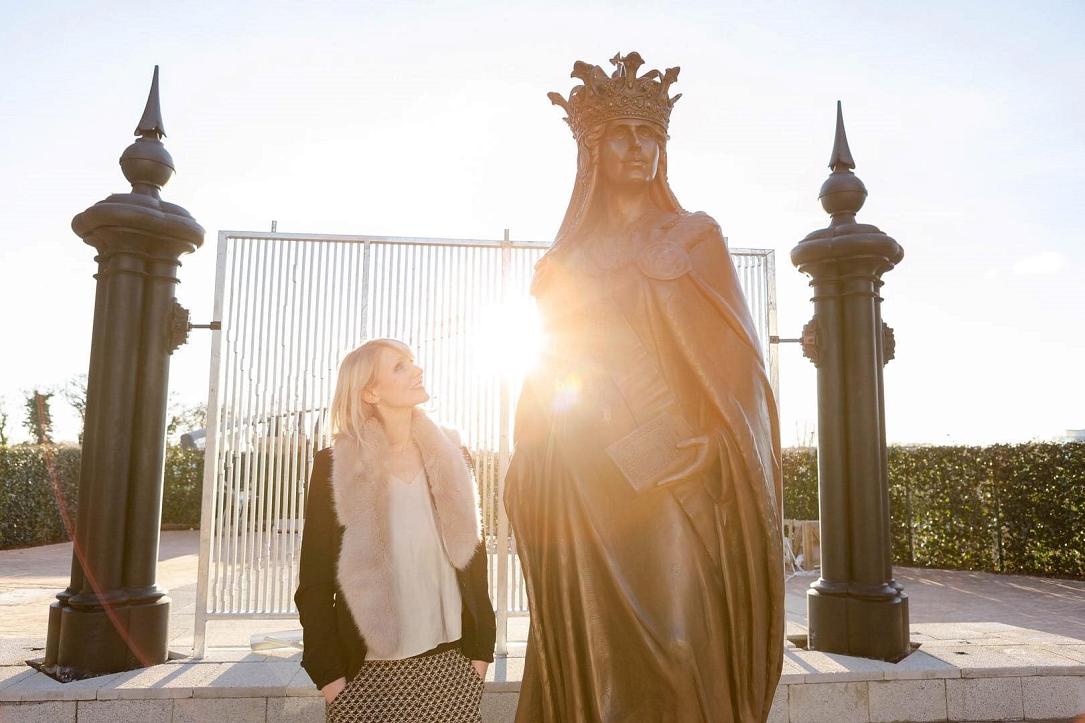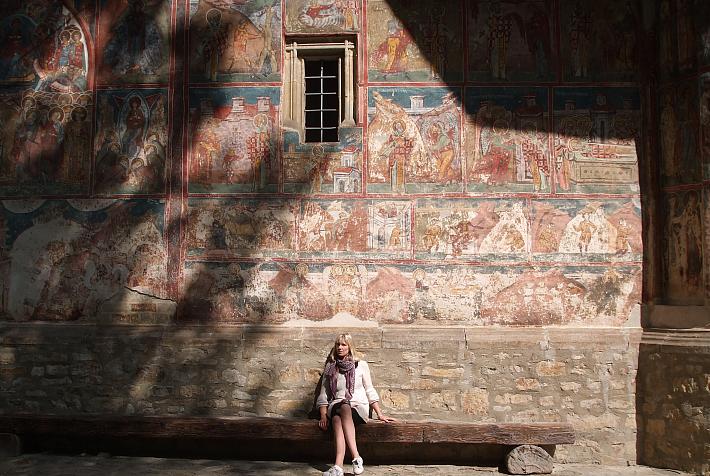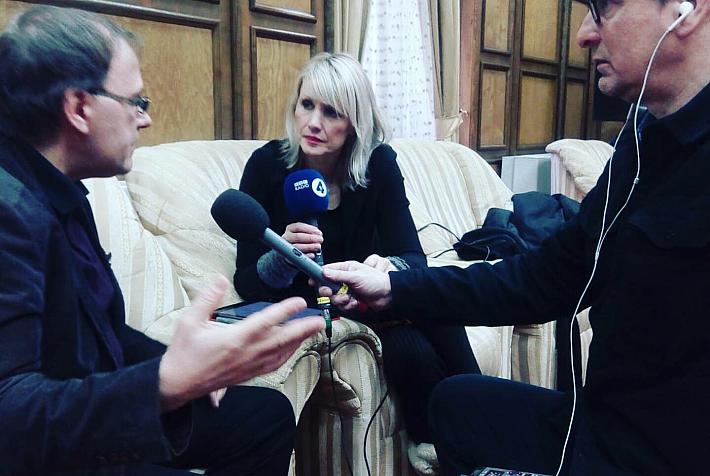A constant connection: British historian Tessa Dunlop on Queen Marie, the importance of the diaspora, and her favorite spot in Romania

British historian, broadcaster, and writer Tessa Dunlop first arrived in Romania in 1992 to volunteer in an orphanage in Siret, in northern Moldavia. The experience was only the beginning of a lifelong connection with the country, both professional and personal. She often writes and speaks about Romania for U.K. media, has completed a Ph.D. on Romanian-British relations in the early 20th century, and has a Romanian family.
In a conversation in Romanian, occasioned by the release of the Who is Romania series, she talked to Romania Insider about Queen Marie, why the country needs to hold on to the relationship with the diaspora, and the place in Romania she enjoys the most.
A best-selling author of The Bletchley Girls and The Century Girls and presenter of numerous history programs, including BBC 2’s award-winning Coast, Tessa Dunlop often explores subjects related to Romania for UK media. More recently, she covered the state of the country’s road infrastructure and the 2019 highway protest and looked at the diverse Romanian community in Britain in programs for BBC Radio 4.
The latest in Dunlop’s work about the country is Who is Romania, a series of short, engaging films profiling Romanian personalities, an initiative of the Romanian Cultural Institute (ICR) in London. The first episode introduced audiences to 15th-century ruler Steven the Great (Ștefan cel Mare), who built the painted monasteries in Moldavia, listed on the UNESCO World Heritage Sites list. Other episodes focus on personalities such as celebrated musician George Enescu, sculptor Constantin Brâncuși, and novelist, playwright, and journalist Mihail Sebastian, among others. Several of the latter’s works have been translated into English, including his Journal 1935-44, which chronicles the rise of anti-Semitism and the intellectual life in interwar Bucharest, and For Two Thousand Years, whose protagonist is a Jewish student in Romania of the 1920s. Another one of his books, Women, is set for release this November.
Cometh the hour, cometh the woman
An episode that already aired is dedicated to Queen Marie, the English-born princess who became Romania’s queen. She was “the right woman at the right time,” Dunlop says of the queen who supported Romania’s entry to the First World War on the side of the Allies and lobbied for the recognition of the unification of the Romanian provinces.
“Cometh the hour, cometh the woman: Maria was the magic of the moment, it was her alliance, her relationship with England and Russia, it was her image,” Dunlop says when looking at her influence. It is easy to be a star when being the president of the U.S., but coming from a small country and having such an extraordinary impact was far more unusual, she explains.
Hers was also a time when the U.K. and Romania established a relationship, Dunlop points out. For hundreds of years, there was no relationship between the two countries, and they fought on opposite sides during the Second World War. Last year, a statue of Queen Marie was unveiled in Ashford, her birthplace. It is the first statue of the queen (in the opening photo) outside Romania’s borders, honoring the personality connecting the two countries.
When asked how she thinks Queen Marie would do in today’s world, she says her influence would be more limited. “I think she was really well suited to the period because; while she didn’t have power, she did have considerable influence.” Nowadays, when women are leaders in many fields and can be prime ministers or presidents, being a queen is a less prominent role.
Dunlop is also interested in exploring the stories of women in communist Romania for a book project that would shed light on a period by which the country is often judged so unfavorably. After 1989, images of the country’s orphanages and neglected children, crammed in small beds, rocking back and forth, shocked the world and shaped a generation’s perception about Romania. “I want to interview women of that period because here there’s no understanding of how bad it was for women; it was a nightmare - the invasion, the regulation of the most private aspect of women: the ability to procreate.”
Leaving their children in an orphanage must have been their last hope, Dunlop says, and the way to understand that period is to talk to “the women who were communists, the women who were married to communists, to the women who abandoned their children because they had no choice, to talk to the women who risked their lives getting abortions, to the women who fought against the Germans and then the Russians, to understand how bad it was; to the women who stood in queues, who didn’t know how to feed their children, to understand how far Romania has come.”
The power of the diaspora
Dunlop says that, on a personal level, work like the recent series ties into her passion for the country and its people and the need to maintain and develop the country’s connection to the diaspora. “This is your biggest challenge, in my opinion: how you hold on to the relationship with the diaspora.”
This summer, she started a Facebook account in Romanian as she wanted to get closer to her Romanian friends. She saw a community coming together, people who can change the country’s image abroad and return to Romania. “The diaspora is a huge positive actually, but if they let go of Romania, that’s when the story’s over.” The diaspora she knows is a diverse one, from the bakery worker and Mihai, who works at a car wash and sends money back to his son in Romania, to the doctor who oversaw her pregnancy. “All three of them are an asset; we gained three, and Romania lost three, so there’s a chance to have a more integrated, deeper, more substantial relationship.”
She also stepped up her efforts to speak Romanian and now insists on speaking the language when Romanians offer to talk in English. She learned the first bits of Romanian in Siret, interacting with the children in the orphanage where she worked and later, with her mother-in-law. One habit in her family is reading out loud, together with her children, in Romanian, as it happens now with the translation of The Lord of the Rings. More than practicing the language, she also wants her children to be able to choose if they want to work in Romania and build a future there.
The pink sky of Moldova
Dunlop, who grew up in Scotland, is also a fan of the Romanian countryside and highlights the country’s biodiversity. “I used to think my childhood in Scotland was pretty wild, but I learned it wasn’t, it was very tame compared to Romania […] Romania takes it up a gear, and I hope that it’s not all lost. It’s so easy, with the need to do intensive farming.”
While agreeing that Transylvania is special, Dunlop says she lost her heart in Moldova. A while ago, she put together a list of what she likes most about Romania, and, towards the end of our talk, she goes over it. “I love Moldova, I love the children there, me a whole year there, their pain became our journey together. I like Siret so much, and when I’m there, it feels as if I’m at the end of the world; I love that so I stick with the pink sky of Moldova.”
Who is Romania is written and presented by Tessa Dunlop. It is an initiative of the Romanian Cultural Institute (ICR) in London and is produced by Storytailors. The episodes can be watched on ICR London’s website and social media channels, and on Tessa Dunlop's Facebook Page. They also aired on History Hit, RoyaltyTV, and the website of Daily Mail.
(All photos courtesy of Tessa Dunlop)
simona@romania-insider.com














